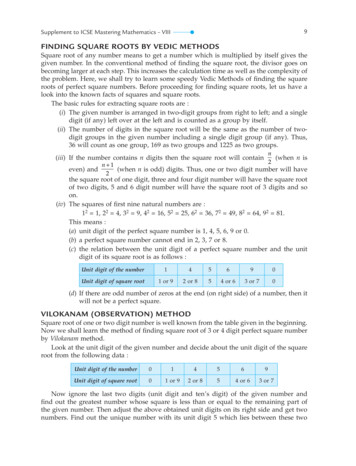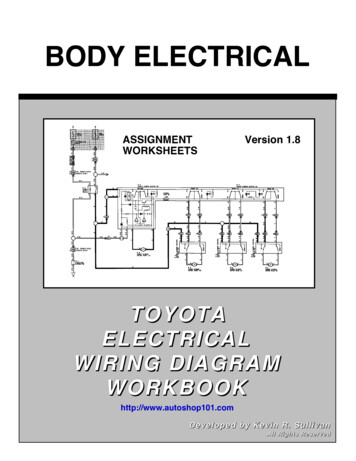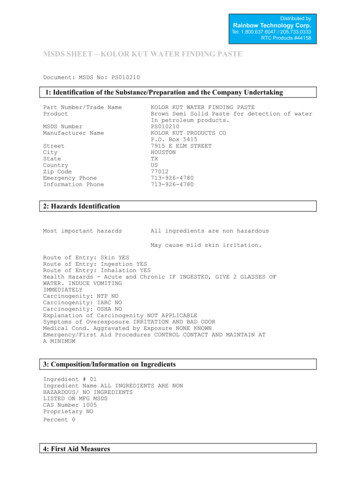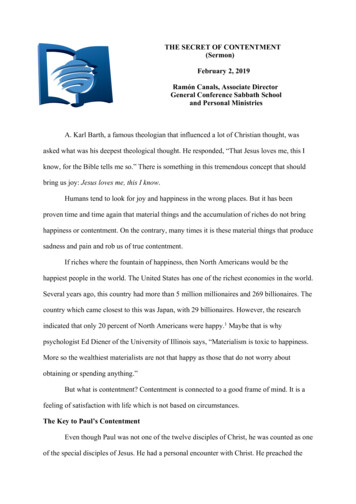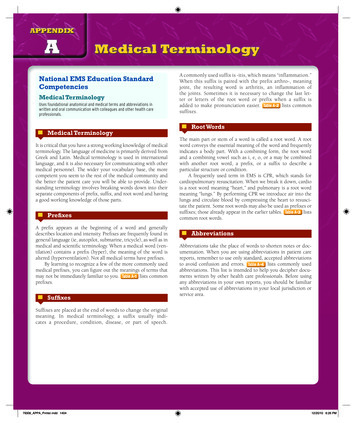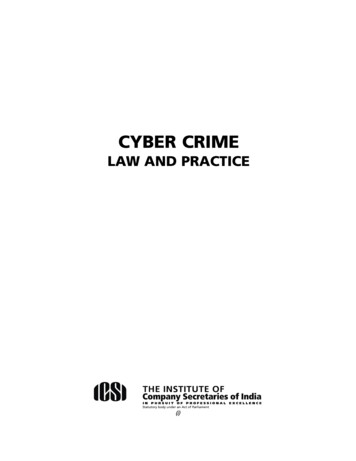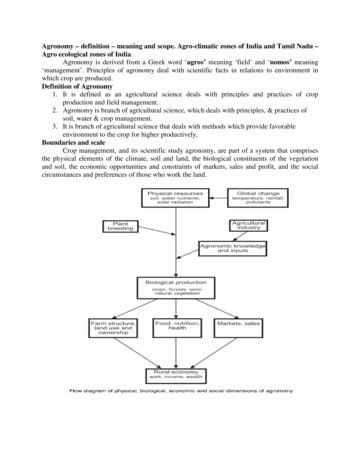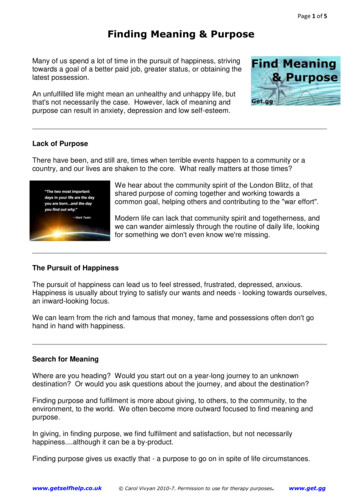
Transcription
Page 1 of 5Finding Meaning & PurposeMany of us spend a lot of time in the pursuit of happiness, strivingtowards a goal of a better paid job, greater status, or obtaining thelatest possession.An unfulfilled life might mean an unhealthy and unhappy life, butthat's not necessarily the case. However, lack of meaning andpurpose can result in anxiety, depression and low self-esteem.Lack of PurposeThere have been, and still are, times when terrible events happen to a community or acountry, and our lives are shaken to the core. What really matters at those times?We hear about the community spirit of the London Blitz, of thatshared purpose of coming together and working towards acommon goal, helping others and contributing to the "war effort".Modern life can lack that community spirit and togetherness, andwe can wander aimlessly through the routine of daily life, lookingfor something we don't even know we're missing.The Pursuit of HappinessThe pursuit of happiness can lead us to feel stressed, frustrated, depressed, anxious.Happiness is usually about trying to satisfy our wants and needs - looking towards ourselves,an inward-looking focus.We can learn from the rich and famous that money, fame and possessions often don't gohand in hand with happiness.Search for MeaningWhere are you heading? Would you start out on a year-long journey to an unknowndestination? Or would you ask questions about the journey, and about the destination?Finding purpose and fulfilment is more about giving, to others, to the community, to theenvironment, to the world. We often become more outward focused to find meaning andpurpose.In giving, in finding purpose, we find fulfilment and satisfaction, but not necessarilyhappiness.although it can be a by-product.Finding purpose gives us exactly that - a purpose to go on in spite of life circumstances.www.getselfhelp.co.uk Carol Vivyan 2010-7. Permission to use for therapy purposes.www.get.gg
Page 2 of 5Viktor FranklViktor Frankl (see “Man's Search for Meaning”) found meaning and purpose even as a Naziconcentration camp prisoner. He noticed that those fellow prisoners lacking a sense ofpurpose gave up and died more quickly than those with purpose. Those with purpose werethe people more likely to survive - they looked back on their lives with a sense of satisfaction,and looked forward to future achievements.Frankl found his purpose in helping his fellow prisoners to find meaning and purpose, even inthose extreme conditions of suffering. For example, the scientist who decided he wanted tofinish his book, and the father who desperately wanted to be reunited with his child (safely)overseas. Frankl found that even in extreme suffering, we can change the way we thinkabout that situation, to give us a sense of purpose.He devised his "meaning triangle" to help us identify the ways we can add purpose to ourlives.Viktor Frankl’s (1964) Meaning TriangleThree Values:CREATIVITY Giving something to the world through self-expressiono Work, good deeds, art, music, writing, inventionEXPERIENCE Receiving from the worldo through nature, culture, relationships, interactions with others and ourenvironment, spiritualityATTITUDE Even if we can't change a situation or circumstance, we can still choose ourattitude toward a situation, condition or suffering – changing the way we thinkabout life situations, seeing a different perspective, looking at it a different waywww.getselfhelp.co.uk Carol Vivyan 2010-7. Permission to use for therapy purposes.www.get.gg
Page 3 of 5Frankl’s Two types of MeaningUltimate Meaning Meaning of the MomentA meaning we can never reach butjust glimpse at the horizon. a lifedirection and set of values ratherthan an achievable goal.We might set goals to achieve whilstmoving in the direction of our lifevalues. Realising we have choices in eachmomentMaking wise and responsibledecisions E.g. Helping othersE.g. What can I do right now, in thissituation, that will be helpful to others?Find YOUR purposeIn order to find your purpose, try doing and experiencing different things. Find yourpassion! You will know when you find it, from how you feel, and that sense of fulfilment anddeep satisfaction.Ask yourself what do you really enjoy doing? What is yourpassion? What really inspires you? What are you really skilledat?What do you want to be remembered for? What do you want tobe your legacy?Be open minded and flexible in how you think about things. Don't discount anything! Weoften have several different purposes, or life values. For example: being a good wife andmother, being a writer, being a teacher. Each one can give you that sense of fulfilment.Meaning and purpose can change over time.Ask yourself how important certain aspects of your life are. Which of these (or others) areMOST important to you? Score them on a scale of 0 - 5 with 0 being not at all imporant, and5 being most important. Relationships: partner, children, parents, siblings, friends etcWork and careerEducation and achievementSpiritualityConnecting with natureHelping othersCaring for the environmentHealth living / lifestyle choiceCaring for animalsYou may find that you have several life values or purposes. You might find it useful toidentify the 1 or 2 that are MOST important to you. Those you feel most passionate about.You have found your life's purpose!www.getselfhelp.co.uk Carol Vivyan 2010-7. Permission to use for therapy purposes.www.get.gg
Page 4 of 5Take Action!DAILY ACTION PASSION PURPOSEFUL LIFEHaving identified your life purpose or values, you can start to move towards and plansomething every day that is purposeful, that takes you towards that purpose.Choose purposeful activities that you can engage in locally, or perhaps support from adistance.You might choose to keep a diary (or Positive Data Log) of what you have done each day,that fits with your purpose or life value.You might identify a SMART goal to work towards, that fits with each of your life values orpurpose.Unfulfilled at workIf your paid occupation or regular activity seems not to fit with your purposeful life: Consider the wider purpose of the organisation you work for.Are there any different roles you can consider outside of your current job description?(e.g. union rep, social activity co-ordinator, or perhaps a more informal role)Find a way of incorporating your purpose within your current role, e.g. if your purposeis helping others, then maybe you can offer assistance to colleagues who are not asknowledgeable or skilledCould you talk to a colleague, supervisor, manager etc who could help you identifyways to change the way you work in or develop your current role?Consider the effect of your paid employment on your life's purpose of e.g. providingfor and supporting your family and/or other meaningful others.If you have trouble identifying meaningful purpose in your paid employment, then youcould do something purposeful outside of work, in the evenings or at weekendsFinding Meaning in Difficult Situations When you find yourself in a difficult situation, ask yourself:How can I make this situation more meaningful?What can I do right now, that would make it meaningful?What can I learn from this experience?What can I change for the future? What can I do next time?How can this experience help me, or help others?www.getselfhelp.co.uk Carol Vivyan 2010-7. Permission to use for therapy purposes.www.get.gg
Page 5 of 5What gives your life meaning?Write down the areas in which you’d like to find meaningWhat do you enjoy? What gives you a sense of achievement? Is there something you’ve always wanted todo, or do more of? What are you drawn to? What makes you feel purposeful? What do you value in life? Having chosen your life direction, ask: What can I do that will lead me towards my life direction? Then break it down into more detail – what you can do, how you can do it, when etc.CREATIVITYWork, good deeds, art,music, writing, invention,helping others,sponsored event,voluntary work, charities,hobbies, interestsEXPERIENCEBeing with nature,music, art, theatre, concerts,galleries, museums, literature,outdoor mindful activity(awareness of environment),mindfulness,being with others,spiritualityATTITUDEChallenging existing attitudes,changing the way we thinkabout life situations, seeing adifferent perspective:STOPP! Is there another way oflooking at this? What’s the bigger picture? How might someone elsesee this situation? What advice would I giveto someone else in thissituation? What’s the most helpfuland best response for me,others & this situation?www.getselfhelp.co.uk Carol Vivyan 2010-7. Permission to use for therapy purposes.www.get.gg
Find a way of incorporating your purpose within your current role, e.g. if your purpose is helping others, then maybe you can offer assistance to colleagues who are not as knowledgeable or skilled Could you talk to a colleague, supervisor, manager etc who could help you identify ways to change the way y
